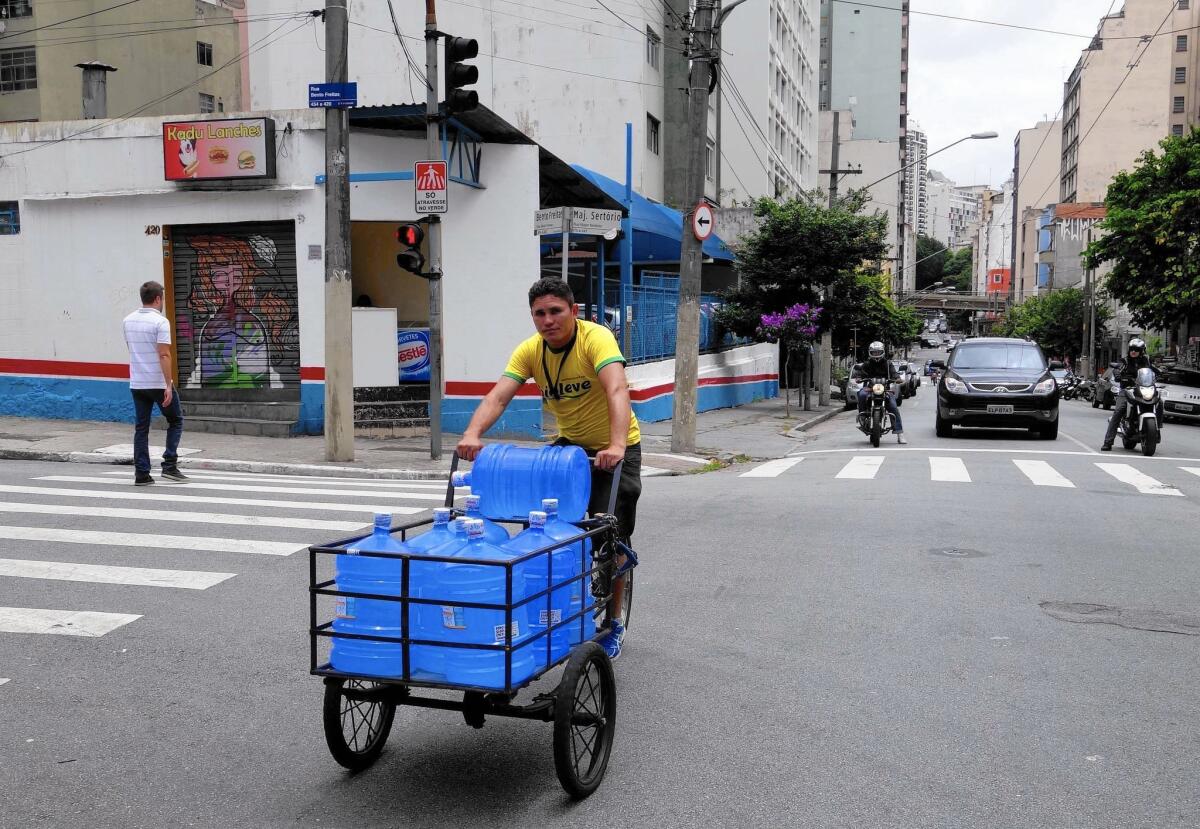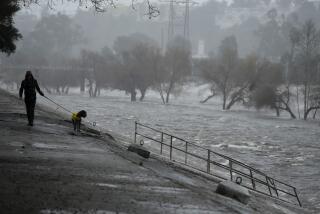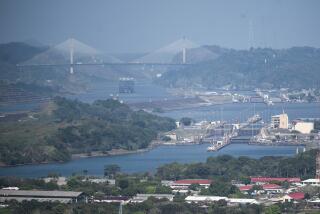In drought-stricken Sao Paulo, some rely on mineral water deliveries

As Joao Paulo Bezerra pedals slowly up a slight incline between skyscrapers, he pauses briefly to greet a struggling colleague crossing his path.
“Morning, buddy,” says Bezerra, forcing his tricycle and its cargo of eight large plastic water jugs a few feet closer to its destination.
“Everything’s beautiful,” says his counterpart, with equal measures of enthusiasm and irony, as they move on, sweating profusely in the summer sun.
Under normal circumstances, Bezerra might be racing up this street on a two-wheeler, nimbly carrying one or two jugs of water while weaving in and out of Sao Paulo’s infamous traffic. Or he might be hopping onto the sidewalk, startling pedestrians as he races to help quench their substantial thirst. South America’s largest city is running out of water, and part of the weight of this potentially disastrous crisis — currently about 42 gallons, or 352 pounds, to be exact — is being pushed forward by his leg muscles.
“Demand for the water we deliver has more than doubled in the last few months,” says Bezerra, panting after arriving at his destination. “People used to get their mineral water from us for drinking. But now there’s no more water! They open the tap and nothing comes out. So they’re relying on us for the water they use to cook or to take showers. Others are just stocking up.”
Water bicycle deliverymen have long been a common sight in central Sao Paulo, risking life and limb to deliver agua to restaurants, offices and apartment buildings. In normal times, tap water here is drinkable, but most Brazilians prefer to run it through home filters or buy big bottles of mineral water, brought in from outside the strained water systems that serve the 20 million people in the metropolitan area.
Since the middle of last year, a majority of residents here say their taps have run dry at one time or another, and many say their supply is interrupted every night. The problem has only worsened during the current rainy season, and the government recently announced the possibility of a radical rationing plan — two days of water, five days without — if the problem persists.
For now, bicycle deliveries are essential to some, who have turned to businesses such as the small San Lucas water delivery service, operated by Kleber Prado from a small garage space. Prado, who purchases his supply from a mineral water firm in a city outside Sao Paulo, says he can’t keep up with demand.
“I took on more employees and now have eight here instead of six. But it’s tough to get guys willing to work with the amount of weight this job now requires,” says Prado, 42, loading big blue bottles from a white Volkswagen van onto a pile in the middle of the dark room. “And even if we could, our supplier will run out sooner or later if people keep trying to rely on people like us.... We’ve never seen anything like this.”
The men, ranging in age from the teens to the mid-40s, earn about $450 a month, about a third more than minimum wage, and each are responsible for about 40 deliveries a day between 9 a.m. and 7 p.m.
The job is dangerous in the best of times. To navigate Sao Paulo’s crowded roads on clunky bicycles and tricycles, they often pull right into the middle of the roadway and put themselves in front of automobiles, hoping that Sao Paulo’s famously less than cautious drivers will see them immediately and prefer moving at a snail’s pace to a messy accident.
With just a few more bottles on his tricycle, Bezerra moves straight toward oncoming traffic, another trick deliverymen swear by, saying they’re less likely to go unnoticed.
“The danger is real, and none of us like that. I was almost taken out once, by a truck which ran over my bike. I jumped out of the way in time,” he says.
During the current crisis, the cyclists also run the risk of being robbed of their mineral water, which comes directly from springs or other sources and must meet certain purity standards. “I’ve heard about people robbing trucks or bikes for water. If that happens to me, I’m going to give up everything as fast as I can, because this job isn’t worth it,” Bezerra says.
No one is quite sure what would happen if the state-run public water service imposed a five-day rationing cycle.
Recently, even bars and restaurants in the city’s upscale neighborhoods have been serving drinks in unwashed cups or shutting down bathrooms.
Most of the bicycle deliverymen live far from downtown, in the kinds of poor neighborhoods where residents reported dry taps long before Gov. Geraldo Alckmin was reelected in October and anyone in the government acknowledged that there was a problem.
Rafael Aparecido Nunes Silva, 17, has done bike deliveries since dropping out of high school less than a year ago, working the water circuit since the drought started.
“Everyone knows there’s no water,” he said just a few blocks from the San Lucas water distribution company during a relatively simple household run. Where he lives with his extended family, water is available only a few hours day, but residents cannot afford to bridge the gap with mineral water.
“That would get too expensive, too fast,” he says. “We try to save up water in the time the taps work — each morning, before I come out here.”
Bevins is a special correspondent.
More to Read
Start your day right
Sign up for Essential California for news, features and recommendations from the L.A. Times and beyond in your inbox six days a week.
You may occasionally receive promotional content from the Los Angeles Times.






